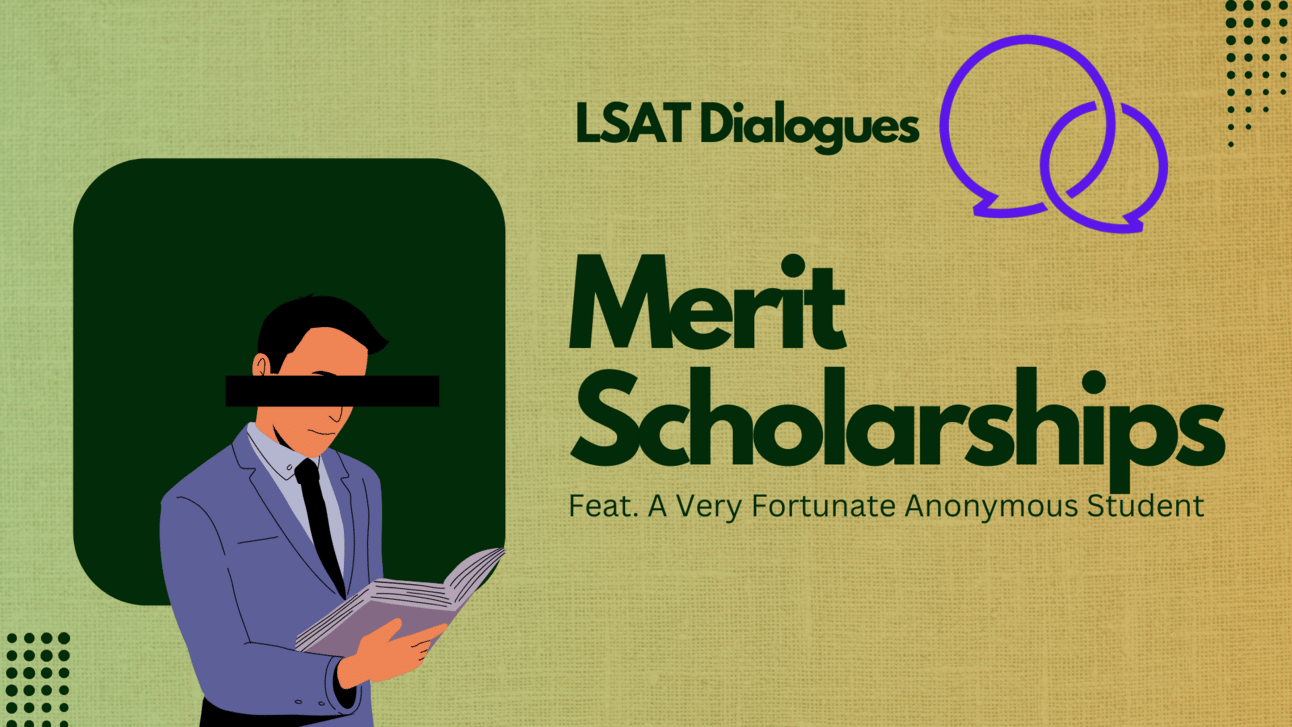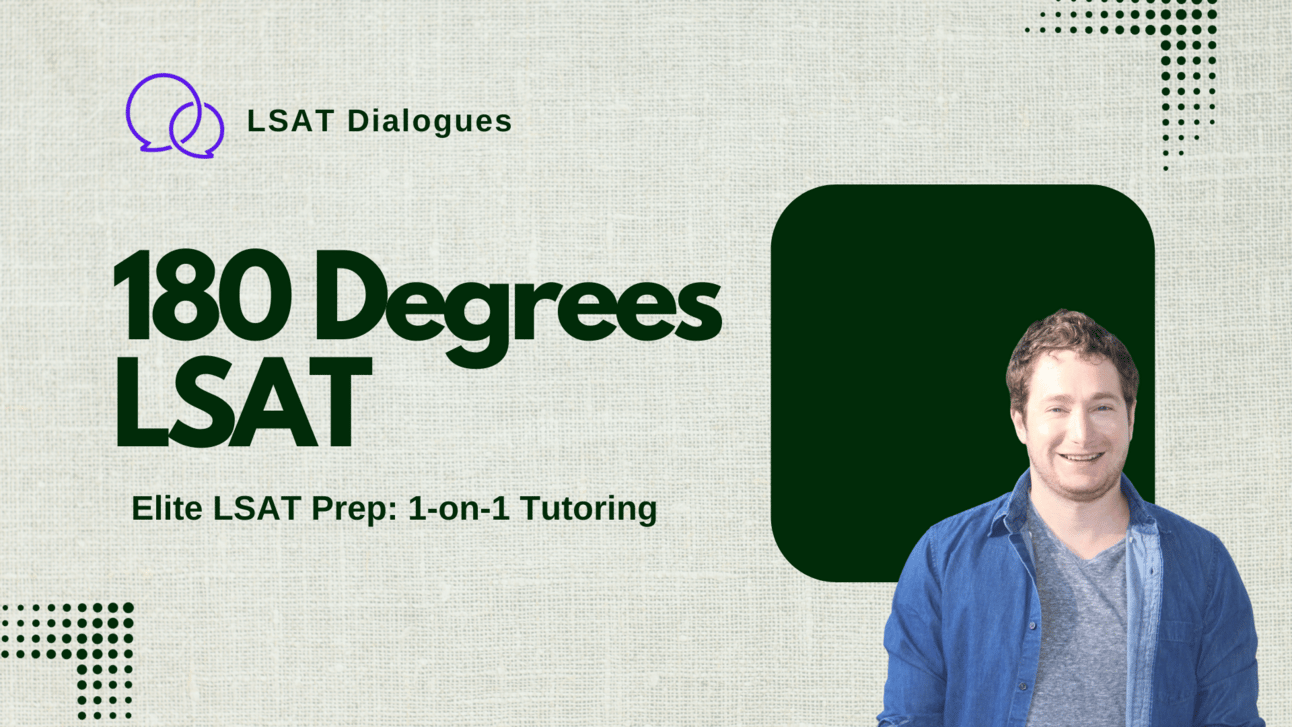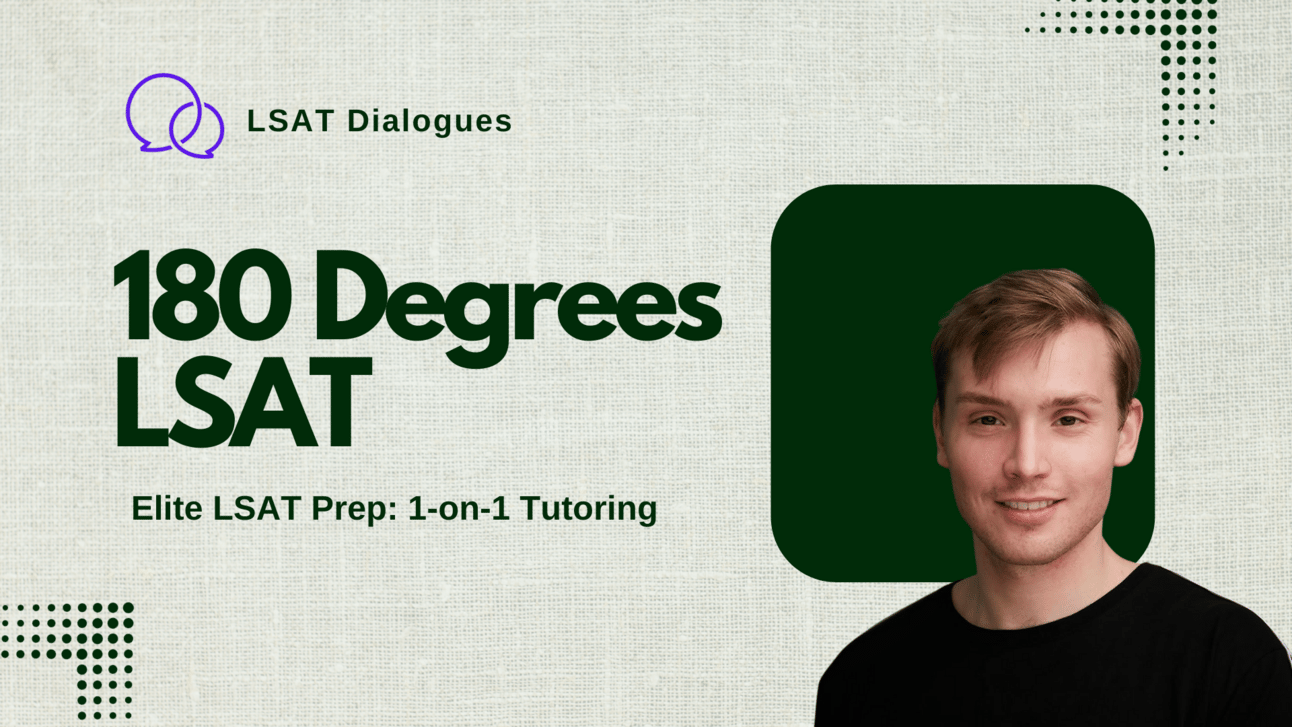- LSAT Dialogues
- Posts
- Merit Scholarships and the LSAT
Merit Scholarships and the LSAT
How a nonchalant attitude can be your greatest asset

Interview with Anonymous Student
Commentary from Larkin Robson
About 180 Degrees LSAT
👋 Hi, Welcome to LSAT Dialogues
Studying for the LSAT and applying to Law School can be a lonely and frustrating experience. Hearing stories from others about what worked (and what didn’t) can make the process better, though.
Today, we chat with an Anonymous Student about how he lucked (there was some skill involved, too) into an incredible scholarships at a top 20 law school.
Stats:
LSAT 167
GPA 3.9 at large state university
Full Ride to a top 20 law school

You are one of the luckiest people I think I’ve ever met – in a law school context
Yeah my experience was pretty nontraditional. And I’m fully aware and very grateful for how lucky I’ve been.
I wasn’t trying that hard. I wasn’t really sold on law generally – I’m still not. So, my senior year, I was exploring a couple different options. Do I get into investment banking? Do I start a company? My resume was interesting – I was a quadruple major. I took a legal ethics class and the professor took a liking to me. She encouraged me to apply to law school. I thought maybe it could be a backdoor into some stuff I wanted to pursue eventually, like private equity or a startup.
I ended up taking a diagnostic test through Kaplan while on a road trip. I was on a greyhound bus. I got a 160. At the time that was maybe the 90th percentile. I thought I might have a knack for this.
That’s a great diagnostic score – then what?
I was curious, but not fully committed. I signed up for the absolute cheapest Kaplan test prep option. It was like $400 for the video-only self-paced course. I didn’t even research other prep courses - Kaplan just happened to be the ones with an info session that week. I was stretched super thin, trying to finish all of my majors and maintain a healthy social life. My LSAT test date was approaching, and I hadn’t completed the course. I was worried that I wouldn’t get my money back if I did poorly on the test.
What do you mean?
Kaplan had a money-back guarantee to improve your score, but only if you completed their course. So the night before the LSAT, I stayed up until 2:30am clicking through the course to finish it. 9am the next morning I take the exam. It was a home football gameday so I’m fully of the mindset that “I just need to get this over with… I have a tailgate to get to.”
I ended up getting a 167, which was okay, that was like the 94th percentile then. Maybe not competitive for Yale or Stanford, but I thought I had a chance at some top 14 schools with my GPA and some of the unique academic things I had done.
I started getting mail from law schools waiving application fees. One school ranked in the mid-teens waived the application fee and invited me to apply for their most prestigious scholarship. It included a full ride plus a guaranteed job at a V5 law firm. The former winners were all like Rhodes Scholars. Whatever.
I paid a guy $100 to proof-read my application essay. It was titled “I Don’t Want to be a Lawyer”.
I ended up winning the scholarship.
That’s incredible that you’re not even really trying and you beat out thousands of applicants
Yeah, and I wasn’t fully clued into how insanely fortunate it was. I showed up for 1L and didn’t know a single law firm by name, much less the firm I was slated to intern for. It took until Spring to realize it was the then top-ranked M&A shop. Eventually it set in that I had to make the most of this. Like “I can’t believe that I just lucked into the top law firm in the type of law I want to practice, and I don’t have to interview.”
What would tell someone considering law school?
So I go back to my undergrad alma mater occasionally to speak to pre-law students. There are a couple things I always try to cover. While I had been extremely lucky, I realize there are others out there approaching this thing blindly and could benefit from a direct dose of reality.
Don’t fall for the marketing of lower-ranked law schools – “we have the third best arbitration program in the midwest” – it doesn’t matter. If you’re trying to do big law – you should go to a t14. The legal industry loves rankings. Maybe this will change in the future, but enrollment isn’t the time to make a statement about unfairness.
Find out where you rank, take a practice test. Is this going to be a big lift? How hard are you going to work at this? 80% of the admissions decision is based on a candidate’s GPA + LSAT. If you’re not well-suited for this, or God-forbid if you’re approaching it as a backup option, then maybe consider an easier way to make money.
If you do insist on going, you need to consider three things in deciding where to go: the school’s prestige, cost and location. Each factor can cancel out the others. Accepted to HYS? Great - you can practice in any city and no cost is too high. Accepted into Texas, UCLA and Georgetown, but with various scholarship levels? Now it’s time to ask a few hard questions.
Just be cautious about blindly enrolling in the #1 school you’re accepted into regardless of the cost, based on the assumption you’re going to make top compensation on graduation. I saw too many students at my school realize they weren’t competitive enough for big law head back to their hometowns straddled in $200K+ of debt just to take an underpaying job they could have earned with a JD from their state school.
Don’t skimp out in investing in yourself. One regret I have - I mean it still worked out, but one regret I have - is that I bought the cheapest prep package and not fully committing. I half-assed prep, maybe quarter-assed prep. What would have happened if I had taken it seriously? Could I have squeezed out another 5 LSAT points? Another 10? What if I had applied early, instead of the absolute last day? All of a sudden the scholarship landscape is totally different.
I don’t think I could recreate my admissions results under identical circumstances. I was wildly lucky. To recreate it, I would need to invest a lot more time and maybe money in the process.
Larkin Robson Commentary:
What did you think of this student? Pretty wild story
I don’t even know what to say about this guy. This is wildly lucky. You know, it’s not a terrible mindset to just try and get it over with. At least that way you tend not to be stressed.
To go from worried about the $400 for Kaplan to getting a quarter of million-dollar scholarship and a guaranteed job at a top 5 firm. Truly incredible. One of the all-time greatest investments.
You’re not a big fan of Kaplan, though.
It’s funny – he laments not taking the course more seriously, but I’m not sure he would have done any better on the test if he took the course seriously.
Kaplan isn’t great. Powerscore, in my opinion, is better.
Why do say that?
I don’t know if I’ve ever told you this story but many years ago, [Publishing Company] hired me to critique an LSAT prep book they wanted to publish. Someone else had written it. I was supposed to give notes.
I basically reamed them about the way the book was set up. I’m sure they felt like they wasted their money because there was no way they were going to write it to my standards.
How long ago was this?
Yeah, so part of my point was this was 15 years ago. I was nobody then. Now, I’m pretty good at this. But the author was also a random person.
With Powerscore at least they’ve really invested and refined the content over the last 20 years and tried (to the fullest extent possible) to give the material some flexibility and explain the reason behind their approach.
The problem, I think, with Kaplan, and it’s just the reality of doing a mass test prep course, is they write to the lowest common denominator – what is most likely to work for the most people. And the problem with teaching a skill that way is everyone is coming into the test from very different starting points.
For this student, coming in with a 160 – that’s a very high level of skill – like he doesn’t need a formulaic approach to achieve a mediocre outcome. He’s already beyond mediocre.

Larkin Robson
About Larkin
While other tutors and test prep companies try to force students to approach the LSAT using a generic one-size-fits-all schemata, Larkin focuses on each student as an individual, building on the skills and modes of thought they already have. His collaborative and unique approach has yielded big results over the last decade and a half as he routinely helps students get into Harvard, Stanford, Yale and the rest of the T-14 (often with big scholarships).
If you’re feeling stuck or don’t know where to start, reach out.
[email protected]

Morgan Barrett
About Morgan
Morgan Barrett has apprenticed under Larkin since 2018. Since starting as a tutor, Morgan has used Larkin's methods and approach to help students get into Yale, Harvard, Stanford, Columbia, Chicago, Penn, and numerous other top schools, often with large scholarships.
While Morgan has helped students of all experience levels achieve their goals, he specializes in helping students who have a decent grasp of the basics but are feeling stuck. If you've taken a course or self-studied but are struggling to break into the mid 160's or 170's, often Morgan's individualized skill-based approach to the test can provide the catalyst to break through to the next level.